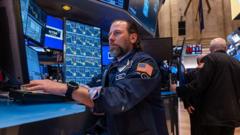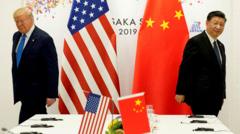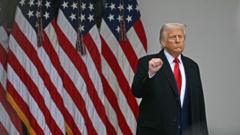Following President Trump's recent tariff announcements, global stock markets experienced a significant drop, led by China’s retaliatory measures, highlighting fears of a prolonged trade war and potential economic recession.**
Global Stock Markets Sink as China Hits Back at New U.S. Tariffs**

Global Stock Markets Sink as China Hits Back at New U.S. Tariffs**
U.S. stock indexes fall sharply amid escalating trade tensions with China, marking the worst week for markets since 2020.**
Stock markets worldwide faced significant turmoil on Friday as China launched a retaliatory strike against tariffs announced by President Donald Trump, intensifying fears of an ongoing trade war that could jeopardize the global economy. All three major U.S. stock indexes dropped by more than 5%, with the S&P 500 suffering nearly a 6% decline, marking the worst week for American markets since 2020.
In the UK, the FTSE 100 saw a nearly 5% drop, its biggest decline in five years, while markets across Asia and Europe also experienced substantial losses. Despite the turmoil, President Trump downplayed the market's reaction, urging his followers on social media to "hang tough" and underscoring the strength of the U.S. labor market, asserting that "we can't lose."
Global markets have seen trillions wiped away in value since the announcement of the new 10% import taxes, which impact a broad range of products from key trading partners, including China and the European Union. Analysts warned that these tariffs may lead to a contraction in trade and could push several economies toward recession.
In response to Trump's tariffs, China retaliated by imposing a 34% tax on U.S. goods, restricting exports of essential minerals, and designating certain U.S. firms to its blacklist, claiming Trump's measures were "bullying" and against international trade rules. Other countries are reportedly seeking to negotiate, despite mixed messages from the U.S. regarding its willingness to engage in talks.
EU Trade Commissioner Maroš Šefčovič stated he had a "frank" discussion with U.S. representatives and noted that the EU is prepared to defend its interests while remaining open to meaningful negotiations. Trump's actions align with campaign promises but were more extensive than many analysts anticipated, leading to some of the most challenging days for U.S. markets since the COVID-19 pandemic began.
The initial sell-off affected major companies such as Apple and Nike, heavily reliant on Asian supply chains, but soon spread to other sectors such as healthcare and utilities, indicating widespread market concern. "The mood is pretty sour and it should be," commented Mike Dickson of Horizon Investments, warning of the prolonged impact of tariffs.
JP Morgan raised the likelihood of a global recession to 60%, up from 40%, predicting growth in the U.S. could slow by 2 percentage points this year due to the tariffs. However, some investors maintained a sense of optimism, pointing to a phenomenal rise in stock value over the past few years and viewing current shifts as a necessary adjustment in global trade.
Despite the intense volatility, certain sectors like housing-related firms saw a slight uptick, as some investors speculated that the economic uncertainty might lead to lower mortgage interest rates. Shares of clothing retailers, including Nike, regained some ground following Trump's mention of a "very productive call" with Vietnam's leader. Meanwhile, agricultural sectors have expressed growing concerns about rising costs and retaliatory tariffs affecting international sales.
Concerns about the prolonged effects of the tariffs are echoed by industry stakeholders, including farmers and exporters, who are bracing for the unknown fallout from these trade tensions. The volatile nature of the markets has led even some Republican sympathizers to hesitate, acknowledging the potential pitfalls of a protracted tariff war.
This dynamic landscape presents a complex challenge for global stakeholders, as many anticipate the broader consequences of escalating trade disputes, which are likely to linger in the financial arena for the foreseeable future.




















